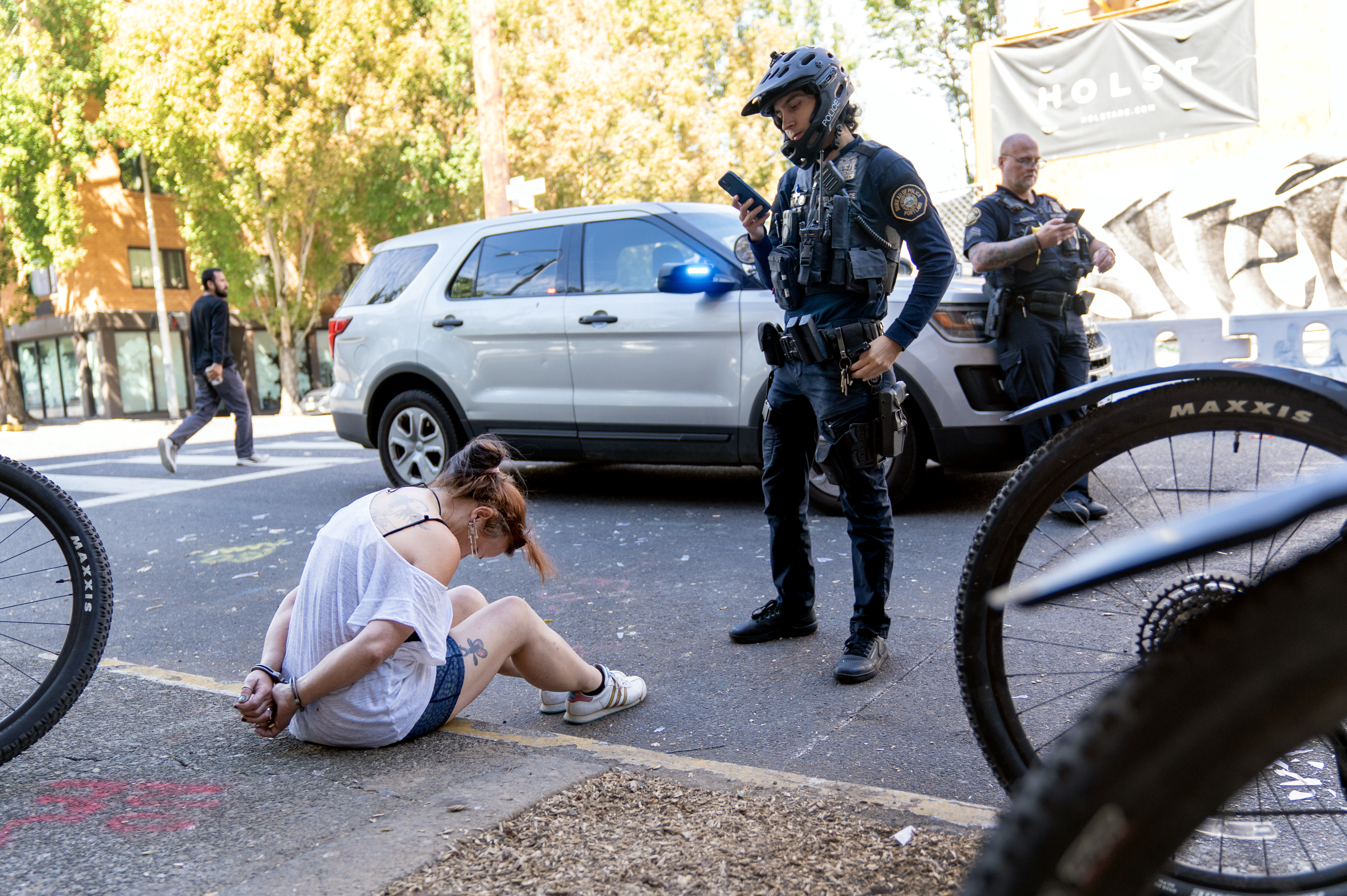
‘The Evergreen’: Drug recriminalization in Oregon is an ongoing experiment
It’s been a little over a month since Oregon officially ended its experiment with drug decriminalization. Now, there’s a new set of experiments going on around the state.
On Sept. 1, Oregon officially rolled back Ballot Measure 110, ending the state's four-year experiment with drug decriminalization. A new state law encourages police officers and prosecutors to connect people to treatment and deflect them away from the criminal justice system. OPB is looking at how the state's new plan is rolling out, county-by-county, and asking: How will recriminalization impact access to drug treatment, the number of overdose deaths and crime trends statewide?
If you or someone you know is struggling with substance use and needs help, the Oregon Substance Use Disorders Services Directory provides a list of agencies throughout the state that can assist in finding treatment services.

It’s been a little over a month since Oregon officially ended its experiment with drug decriminalization. Now, there’s a new set of experiments going on around the state.
Counties will approach enforcement differently, providing yet another large-scale experiment in drug policy.
Oregon lawmakers passed House Bill 4002 earlier this year, which added new criminal penalties for drug possession.
Oregon has ended its experiment with drug decriminalization. Starting Sept. 1, possession of small amounts of illicit substances are once again considered a misdemeanor crime.
Thanks to member support, OPB shares stories that inform, enlighten and inspire our communities.

Under Ballot Measure 110, instead of arresting drug users, police give them a citation and point them towards treatment. Over three years in, there's a debate about whether it's succeeded or failed.

Fueled by fentanyl, the number of overdose deaths in Oregon has soared since 2019. And while the surge in overdoses is part of a national problem, the state’s underfunded treatment system is struggling to provide local solutions.

State legislators will spend much of the next month debating whether to scrap Measure 110, Oregon's voter-approved effort at drug decriminalization. Their decision will directly impact the first responders who deal with drug addiction on the streets of Portland. But has decriminalization caused the spike in overdoses and public use, or has it simply made the crisis impossible to ignore?

Just over three years since Oregon voters passed Ballot Measure 110, elected officials want to repeal key elements, blaming the law for open drug use and soaring overdoses. But it’s their own hands-off approach that isn’t working, advocates say.

State estimates show 1,333 people will be convicted of drug possession and 533 could go to jail every year under the bill approved by lawmakers last week.

Some of the people at the heart of that process believe Oregon is on the verge of making critical mistakes that mean many parts of the state will flop when it comes to meeting the overarching goal: steering drug users who are causing public angst and disorder away from the public eye and toward recovery.

In less than a month, Oregon will end its nearly four-year experiment with drug decriminalization. Beginning Sept. 1, possession of small amounts of drugs will again be a misdemeanor crime.

Multnomah County officials announced Monday that they will temporarily halt the opening of a deflection center, where police could have taken people arrested for drug possession to access treatment.

Along with concerns of how feasible it will be to get the facility up and running in a few weeks, incoming Multnomah County District Attorney Nathan Vasquez said there are ongoing questions about how many people will be served based on current requirements.

At the beginning of August, a state grant committee rejected Clackamas County’s $1 million program over concerns it too closely resembled a process for someone charged with a crime. While Monday’s debate before the Criminal Justice Commission’s IMPACTS grant committee was about whether to reconsider a relatively small amount of money, the back and forth illustrated disagreements among key stakeholders about a central part of Oregon’s new state law known as defection.

Leaders from Multnomah County and the city of Portland outlined their plans Wednesday for how to address drug possession after a new criminal charge goes into effect statewide in September.

Counties across the state are working to establish "deflection programs," a collaboration between law enforcement agencies and behavioral health entities to get drug users into treatment, rather than the criminal justice system. In Multnomah County, the proposed plan has hit snags.

In 2018 and 2019, an average of two people per month in Multnomah County died from a fentanyl overdose, according to a report by the Multnomah County Health Department. By last year, the average number rose to nearly 36 deaths per month — “More than one per day,” said Emily Mosites, the county’s epidemiology manager.

The Eastern Oregon Center for Independent Living keeps its focus on treating the root causes of addiction.

Under the pilot program that started last year, police would still issue Measure 110 tickets, and offer an immediate opportunity to connect with a treatment provider. Police and treatment workers have connected with more than 150 people during the 10 days they’ve worked together, according to Devon Downeysmith, with the Health Justice Recovery Alliance, key supporters of Measure 110.